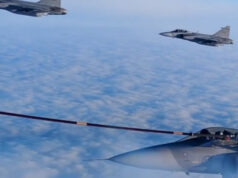Dr Andrew Murrison, Conservative MP for South West Wiltshire, has criticised the UK’s missile and drone defence capabilities, describing them as “patchy” and insufficient to meet modern threats.
Speaking during a debate in the Commons Chamber on 16 January 2025, Murrison warned of gaps in air defence that leave the UK exposed.
“Among the many issues that should be keeping Ministers awake at night are two tech-based conundrums that particularly worry me… the patchy nature of the protection of these islands against missiles and drones,” he said.
While praising existing systems like the Type 45-mounted Sea Viper and the ground-based Sky Sabre, Murrison cautioned that there are simply “not enough of them—not enough missiles ready to go and not enough industrial capacity to enable resilience in anything more than the very short term.”
The Armed Forces Minister, Luke Pollard, responded by acknowledging these challenges and outlining the Government’s plans to address them through the recently commissioned Strategic Defence Review (SDR). “Britain’s island geography may have deterred aggressors throughout much of our history, but it is no shield against sophisticated weapons and modern air warfare,” the Minister said.
Pollard highlighted the importance of the UK’s NATO commitments, particularly in the context of integrated air and missile defence. “Integrated air and missile defence is an area that all NATO members need to develop. There is not one answer that everyone has reached for yet. It is a difficult, wicked problem that requires investment and a change in strategy,” he said.
The Minister pointed to ongoing collaboration with NATO allies, including operations in Estonia and NATO air policing along the alliance’s eastern flank. “We have a plan to increase our defence spending from 2.3% to 2.5% of GDP,” he stated. He also said that any additional funding would focus on enhancing interoperability and lethality in coordination with NATO allies.
Dr Murrison questioned whether the UK should join Germany’s European Sky Shield Initiative (ESSI) or consider systems like Israel’s Arrow 3 missile defence. “Germany has recognised that threat; it has owned the consequences of doing nothing,” he noted. The Minister responded that the SDR would explore such options, including opportunities to learn from NATO partners’ experiences.
The debate also highlighted concerns about the UK’s industrial capacity to produce and maintain defence systems. Murrison pointed out that the UK currently lacks the ability to sustain air defence operations over a prolonged period, noting, “Russia, as we have seen in Ukraine and throughout its history, is capable of taking long-term pain in a way that it seems unlikely we would.”
Pollard agreed that resilience is a key focus of the SDR, adding that “protection of airspace and critical national infrastructure is a priority.” He mentioned the UK’s participation in the E5 Defence Ministers meeting in Poland, where allies discussed integrated air defence solutions.
Murrison also raised the issue of future technologies, questioning whether the UK is on track to develop directed energy weapons, such as the DragonFire system. He asked whether the system would be ready for service with the Royal Navy by 2027 and if it would be fitted to new warships like the Type 26 and Type 31.
Pollard confirmed that directed energy weapons are part of the UK’s long-term defence strategy and that the SDR will consider their deployment. “For a country with no money, directed energy weapons offer a potential solution for dealing with drones and missiles, albeit in line of sight and in good weather,” Murrison remarked, underscoring the need for innovative solutions.
In his closing remarks, the Minister stressed that the SDR is an opportunity for the Government to take bold action in addressing the challenges raised by Murrison. “The SDR needs to be bold, and that is in effect the remit given to Lord Robertson, Fiona Hill and Richard Barrons by the Prime Minister and the Defence Secretary,” he said.
As Murrison put it, “The UK and Europe need NATO integrated air and missile defence that incorporates close-in systems to guarantee major centres of population, defence assets and critical national infrastructure.”














I think Dr Andrew Murrison needs to remember his party were in Government for over a decade and did nothing to address the problem!
Be lucky if this government do anything about it has both got head’s in the sand .
He does not seem to be point scoring.
It seemed to be a reasonable debate.
Why has the UK not bought PAC – 3 Missiles Spain has bought them we could get them land based
Because we have a native R&D industry to support.
We are rather good at designing missiles.
The CAMM family is a massive success.
HMG is rather bad at buying them!
And Aster 30 covers the ballistic missile capability.
Which should mean Aster is good enough for part of the GBAD requirements.
This article makes a comparison of various systems currently avaible.
May be an english version is available.
https://meta-defense.fr/2025/01/20/systemes-anti-balistiques-anti-aeriens/?is_wppwa=true&wpappninja_cache=friendly
Not really it does not cover the type of ballistic missile that would be fired at the UK MRBMs and IRMBs.
It really does irritate a little when all of a sudden MPs whose party are no longer in power start to highlight an issue that their party created or was part off…this is not a conservative dig as both parties are the same…you no longer hear Labour MPs asking about defence now they are in power.
There is I feel a problem with party politics in the UK as it seems to very much be a case of not party first, but party “Always”……I would like to see a bit of a change to be honest…there is a definite case to start some work on the UK constitution. Maybe have separation of the executive from parliament and a requirement for MP candidates to be local people, selected locally in more open votes. Maybe then they would have a bit more of an electorate first mentality.
The whole of parliament is meant to hold the executive to account, the problem with our present system is parliament cannot hold the executive to account because essentially the majority of the parliament is totally beholden to the executive’s every whim.
Also because they risk suspension and ejection from their party on spurious grounds if they go rogue.
I have suggested in the past, when this subject has come up, that the only way to deal with this kind of issue is to significantly update our democratic systems;
1. Limit the power of the party whips to allow MP’s to ask questions, especially if raised by a constituent. They should also have some leeway when vating;
2. Democratise the House of Lords with elections mid-way through the normal parliamentary cycle. This would also require a fixed term for the House of Commons so that PM’s could not go to the polls when they were popular (or at least not completely unpopular!).
3. The House of Lords would use a proportional voting system to reflect the national preference whilst the House of Commons would retain the first past the post to maintain the local connection between MP and constituents.
Currently, it is possible to appoint Ministers from outside Parliament (a la David Cameron as Foreign Secretary). This can be a good thing if used sensibly by allowing individuals with particular experience or skills to be co-opted into Government. Currently that is done by making them a Peer. I would retain that at least initially for the Cabinet. I might also allow a limited number of appointed Peers to sit in the House of Lords to bring additional real world experience into our politics but I would limit their time in the House and require that they are Independents…
Limiting the power of the parties over freedom of speech within parliament is a challenge as I can see that both parties and the country need some level of discipline if things are to get done, but the current system is definitely not working in the country’s interests IMO.
By the way, nothing like this will ever happen soon – too many vested interests.
Cheers CR
What about Dragonfire and Ancilia also for the carriers? Why no mk41s onto the T45s instead of just the 24 CAMM? Why not some SAMP/T and or CAMM-MR for GBAD? Where is all this truly at? All mentioned by many of us here for ages and all doable and we know it will cost money. If they want Britain to remain global and need more fighting ships why not order a few more T31s or T26s now? Let’s hope this “SDR” is a good one for the UK.
No need to panic but this issue needs to be addressed based on the increased use of missiles in the current World combat zones. Many are small and easily deployed and the concept of them being used by terrorist groups must be of concern to us all. Ship-based systems using longer-range weapons could be fired from any innocuous-looking vessel into the heart of our cities. If in the unlikely event, another power decides to make the first strike on critical infrastructure we need to be adequately protected and some form of skynet integrated network established in the longer term.
Given the increasing use and development of container sized systems there would be little to stop someone from loading a container ship with strike weapons and setting them off automatically. You properly wouldn’t even see them being put together as a container is small enough to put in pretty much any factory or warehouse building. Package up a few missiles with a basic preset target and a GPS trigger system, load it onto a truck with the ‘right’ paperwork and send it on its way. Chances are no one will know about it until the missiles fly. You would, of course, need to ensure that at least some of them are on the top of the container stack (if VLS is used) but I’m sure that could be arranged with careful planning.
Only answer is adequate air/missile defence coverage, and as an island the missile flight would be straight towards us with no allies’ defences to help us out, so the political / MoD assumption that our Eastern European allies provide a buffer suddenly looks very dubious indeed.
As 9/11 demonstrated it is possible to mount a surprise with a bit of luck. The defenders have to get lucky every time, the attackers only have to get lucky once to inflict horrifying impact and it need not be a none state actor either. As we have learnt from Salisbury a rogue nation with an effective deterrent might give it a go if it wants to slap a second tier nation down as a warning to others, especially if it can apply the strategy of plausible deniability to confuse the issue.
We desperately need to start to think outside of the box and consider the unthinkable. We are entering a pre-war era, if we are not already in one of that I am convinced.
Cheers CR
I totally agree, the UK can not rely on NATO to protect our skies from terrorist missiles entirely. As you say, there are many ways to deliver such ordinance and will typically be crude but effective. Drone weapon strikes could be used initially but the political milage from a significant missile strike carries more weight. Unfortunately, the Treasury requires tangible evidence and until such time the threat is in our faces then and only then, will we see defence systems in place. Cynical, yes but I’m sure governments wait for such activity before spending significant money as they would base their strategy on factual evidence over theoretical apotheosis.
Just to add more context the T45 and forthcoming T26/T31 weapons configuration. During the last 15 months the US Navy on Operations in the Red Sea, has faced over 400 Houthis airborne threats ranging from anti-ship ballistic missiles, anti-ship cruise missiles, suicide unmanned aerial vehicles as well as suicide unmanned surface vessels. In all it has used 120 SM-2, 80 SM-6 and a combination of 20 SM-3 and ESSM. What hasn’t been widely reported, is that the majority of the UAVs were taken out using the Mk45 5″ gun.
The US Navy has already instigated rapid capability programs from lessons learned. One of which is a better ability to reload the ship’s Mk41 VLS whilst underway at sea. Currently they have to return to port to rearm. Which is taking far too long and removes a combatant from protecting shipping transiting the Red Sea. Noticing the very large expenditure of missiles used to shoot down drones, whilst also noticing that the Mk45 was providing a very good capability to knock down the drones, at significantly lower price per shot. It seems the Hyper-Velocity Projectile (HVP) program has been restarted. Admittedly the US Army has also placed a contract with BAe in Dec 2024 to build a batch of HVPs to be tested with the Paladin 155 SPG. It seems both services are looking at the guided HVP to provide additional, lower cost air defence capabilities.
Looking at the T45, it successfully took out Houthis drones using the 30mm DS30 mounts along with the Aster missiles. However, the MK8 4.5″ was not used, as it no longer has the capability to be used against airborne threats. Which means there is a huge capability gap, along with significant costs on overly relying on Aster to take out fairly cheap drones. Even when CAMM is fitted, the cost of using CAMM versus a drone, is still a huge cost disparity. Perhaps the RN need to revisit the Mk8’s requirements and re-instigate the airborne threat user requirement. It is probably out side the scope of available funding. The HVP is a sabot, it would be interesting to see if the dart is small enough for the 4.5 whilst making a scaled down sleeve. This would give the ship a significant boost in capabilities along with additional options for air defence.
For both the T26 and T31, these ships may be better suited to deal with lower cost threats like the suicide type UAVs. As the T26 will have the Mk45 5″ along with the chance of using the HVP guided round. Which at $85k per round, is significantly cheaper than using CAMM. Similarly with the T31’s Mk110 57mm and MK4 40mm, a significantly lower cost solution is available to deal with UAVs, even when using the more basic 3P fuzed HE ammunition. Just remains to be seen what else apart from the standard CAMM will the ships be equipped with for air defence. The Houthis availability and use of fairly sophisticated anti-ship ballistic missiles as well as the standard anti-ship cruise missiles. Must mean that the ships require more than just a local air defence, as these types of threat have become more available and widespread. I believes they should also get at least CAMM-ER and possibly CAMM-MR. Which would give them significantly more reach, but also a better layered air defence.